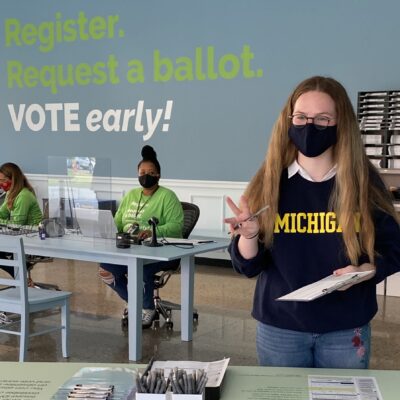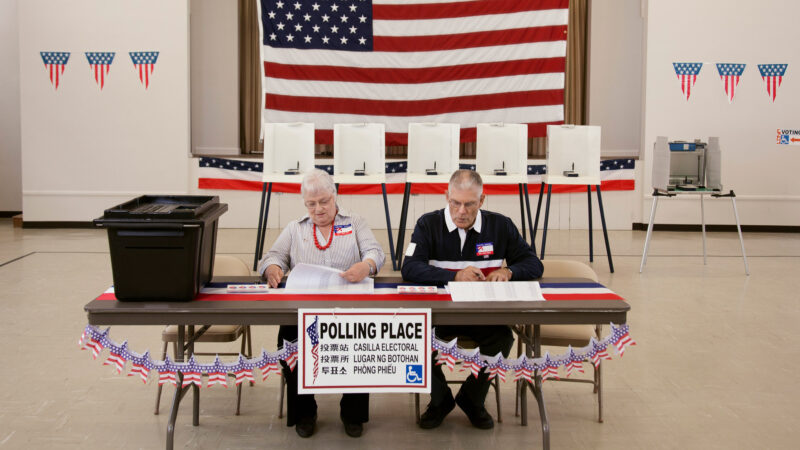Standards of conduct for election workers
Standards of conduct set expectations for participants and observers in normal election operations

What you’ll need
- Microsoft Word or Google Docs to edit the templates and posters
- Access to printer (for optional posters)
- Key provisions from state election law on allowed and prohibited conduct at voting locations and observation opportunities
Getting started
Election officials are responsible for conducting an election that not only runs smoothly but follows the law. Myriads of “election workers” are needed, including full- and part-time staff, temporary and seasonal workers, poll workers, and volunteers often representing different political parties. Highly skeptical individuals may volunteer to serve in one of these capacities, hoping to uncover fraud being perpetrated or flawed practices. In all of this, voters are looking for assurances that the work done in an election – by professionals, other workers and volunteer partisans – is free from malice or political bias.
In the next section, you’ll find a link to the resource itself, which includes five sections:
- Oath of office versus Standards of Conduct
- Identifying behaviors that may violate election laws
- Examples of Standards of Conduct
- Role of training and core competencies
- Monitoring and reporting
You will also see ideas on how to apply Standards of Conduct to your poll worker operations.
Using the toolUsing the tool
Written Standards of Conduct should be developed ahead of each election and reviewed afterward. Considering the duties of the election official in administering elections, there are likely implied duties for election workers that can underpin the legal and moral authority of such Standards, particularly with the support of legal counsel. Standards can be successfully incorporated into:
- New hire orientation (full- and part-time staff as well as temporary or seasonal workers)
- Candidate, political party, and observer trainings and guides
- Public meetings and observation opportunities (logic and accuracy testing, auditing, canvass/certification, etc.)
When it comes to poll workers, you can implement Standards of Conduct at each stage of your work: hiring, training, managing, and retaining.
Aligning with legal and administrative advice1. Aligning with legal and administrative advice
Standards of Conduct are strongest when they align closely with legal and administrative advice in your jurisdiction. Consider consulting these sources as you develop your office’s Standards.
- State and local election law — It is helpful to outline key provisions of your governing election rules related to conduct at voting locations and observation opportunities, particularly about obstructing election officials and processes. Local, county, or state legal counsel may be able to assist you. Keep a copy of these key election rules, including clear guidance about when you can dismiss an election worker or remove an unruly observer.
- Human Resources departments and/or legal counsel — You may be able to request documentation that confirms your authority to enforce the Standards of Conduct from either an HR or legal department.
2. Using this tool with poll workers
Hiring
Clearly communicate the importance of adhering to these Standards to anyone recruiting or hiring poll workers. One way to do this is to review the Standards before each election — either yourself or, if you have a team, as a group. Consider posing questions like:
- Is there anything unclear about the Standards?
- Since we want every poll worker to uphold these Standards, how will we identify applicants that will or won’t?
- Were there any issues with the Standards in the last election?
- How can we emphasize the importance of the Standards during the hiring process, so that every person we bring onboard understands that following the Standards is a firm expectation?
Emphasize the significance of impartiality, professionalism, and strict adherence to election rules and laws to your team.
During the hiring process, assess candidates for their understanding of and commitment to upholding the Standards of Conduct. For instance, you can include the Standards in the application and have applicants check a box agreeing to uphold them. When you use email to follow up with applicants to complete the hiring process, you can include the list of Standards (or a link to the list) in the email to reinforce how important they are.
Training
To ensure that election workers are well-prepared to meet the Standards of Conduct, cover the Standards in all poll worker training. A comprehensive training covers both the technical aspects of being a poll worker and the ethical and behavioral expectations outlined in the Standards.
Incorporate real-world scenarios (storytelling) and case studies to help election workers understand how to navigate challenging situations while maintaining neutrality and professionalism. Make the Standards of Conduct a key component of the training curriculum, encouraging open discussion and questions to emphasize their importance. Ensure that training gives election workers clear expectations and identifies behaviors that are acceptable and unacceptable according to the Standard of Conduct.
Additionally, reinforce during the training the importance of reporting any violations or concerns related to conduct during their duties, and practice how to report issues through role playing. Poll workers should know exactly what to do if they see a potential issue– whether it’s documenting the issue, alerting a head poll worker, contacting your office, or another approach.
Managing
The voting period is where the Standards of Conduct shine. Because they lay out specific unexpected or unacceptable behavior, it’s easier for teammates to spot and call out issues if necessary.
Your implementation plan should also include clear guidance on what steps poll workers should take if there’s an issue: Do they tell the head poll worker? Do they call a specific phone number? Whatever your process for escalating issues, make sure it’s written out and handy, and that your office is ready to respond quickly. Dealing with a potential bad actor is stressful enough without uncertainty about how to respond.
You might consider a few resources to make it easier to identify, respond to, and track potential unexpected and unacceptable behaviors.
- Hang up posters to remind staff about expectations (a template is included in the resource)
- Track issues using an Election Incident Report (a template is included in the resource)
Retaining
To retain election workers and foster commitment to upholding the Standards of Conduct, administrators should recognize and appreciate good behavior. Express gratitude for their dedication to the integrity of elections and their roles as public servants. Encourage a sense of community among election workers by organizing gatherings or events, allowing them to build relationships and strengthen their commitment to fair and impartial elections.
Additionally, solicit feedback from election workers to continuously improve the implementation of the Standards of Conduct and the overall election process. Consider adding questions about the Standards of Conduct in post-election surveys:
- Did you see any behavior that may have violated our Standards of Conduct?
- Is there anything you were uncertain about when it comes to what is and isn’t allowed at a voting site?
Customizing for your office
Any tips for customizing this resource for my office?
Know the rules and regulations for your jurisdiction regarding election worker and voter conduct. This will be imperative for your Standards of Conduct.
Collaborate with community organizations, educational institutions and civic groups to diversify the pool of potential election workers, reflecting the community’s demographics and ensuring a fair and inclusive election process.
How do I know if this resource is helping?
In the case of an incident, poll workers should report an incident right away through the correct channels. The Standards of Conduct should also help you respond quickly, confidently, and definitively.
If you’re hearing about incidents after the fact, getting reports to the wrong person or phone line during voting, or otherwise seeing confusion related to the Standards of Conduct, consider teaching information about the Standards in a new way during training for the next election. You might also check in with poll workers to understand what needs clarification, which might include a post-election survey.
Which Values for Election Excellence does this resource support? Why?
Values for the U.S. Alliance for Election Excellence define our shared vision for the way election departments across the country can aspire to excellence. These values help us navigate the challenges of delivering successful elections and maintaining our healthy democracy.
Alliance values are designed by local election officials, designers, technologists and other experts to support local election departments.
You may find this tool especially helpful for these Values:
- High integrity. When you have a plan for dealing with potential disruptions, you ensure bad actors don’t compromise normal operations, preserving trust in the process. Standards of Conduct also provide a consistent framework for evaluating staff. So, in the rare case you need to remove disruptive staff, you can point to the Standards to show that you are not targeting the particular staff member based on beliefs, speech, or other factors — just the same expectations you have for every person working on the election.
- Voter-centricity. Having established Standards of Conduct for election workers will provide for a better experience for voters. When poll workers provide consistent service, and rare bad actors are quickly identified, voters benefit from a smooth voting experience.
- Comprehensive preparedness. Standards of Conduct help election workers feel more prepared and confident for their role. And, in the rare event you need to intervene, you have a consistent plan in place to respond quickly and in line with the governing rules in your area.
To learn more about the Values for Election Excellence, and to see the full list, visit the Alliance website.
Sharing feedbackSharing Feedback
How was this resource developed?
This resource has been put into practice by at least one jurisdiction. Share your experience with this resource and improve it for your peers by reaching out via support@ElectionExcellence.org
How do I stay in touch?
- For the latest news, resources, and more, sign up for our email list.
- Have a specific idea, piece of feedback, or question? Send an email to support@ElectionExcellence.org


